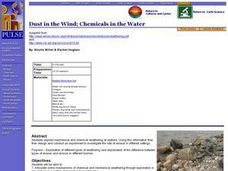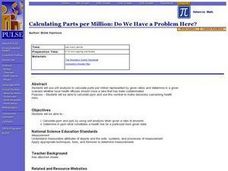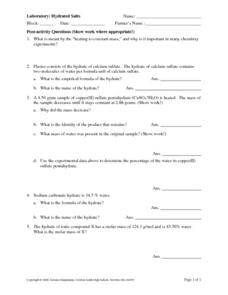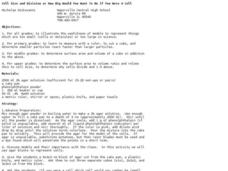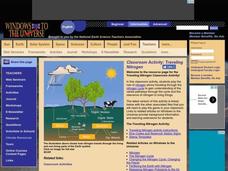Curated OER
'Round and 'Round it Goes!
Students discuss and interpret background knowledge on poster copy given on the water cycle. Students complete the included activity sheets using the poster as a reference in small groups. Students identify and name where water can be...
Curated OER
Science Lesson: Chocolate Flavored Cherries
Students are able to identify start and stop sequences in DNA. They are able to model using restriction enzyme and ligase to remove sections of DNA and reattach them. Students are introduced to the process of recombinat DNA through the...
Curated OER
Dust in the Wind; Chemicals in the Water
Students explore mechanical and chemical weathering at stations. They articulate some mechanisms of chemical and mechanical weathering through exploration in a lab. Students stations describe how chemical weathering differs from...
Curated OER
The Energy Debate - Energy of Peanut
Students articulate the difference between the terms heat and temperature. They calculate the amount of energy associated with a given temperature rise and design an experiment to measure the energy of a fuel.
Curated OER
Calculating Parts per Million: Do We Have a Problem Here?
Students calculate ppm and ppb by using unit analysis when given a ratio of amounts.
They determine in ppm what constitutes a health risk for a particular toxin given data
and whether local health officials should close a lake...
Curated OER
Genetics 5 Technology
Students, after studying extraction and gel electrophoresis, recombinant DNA, transgenic organisms, and reproductive cloning, summarize the main concepts in DNA technology. They analyze the applications of DNA: forensics, medicine,...
Curated OER
Temperature Scales
Eighth graders explore how to read a thermometer. They convert temperature between Celsius, Fahrenheit and Kelvin. Students explain that Celsius is used in the Scientific community and Fahrenheit is used basically only in the United...
Curated OER
Physical and Chemical Properties of Matter
Students identify the physical and chemical properties of matter. They review the types of matter. Students list the four states of matter (Solid, Liquid, Gas and Plasma). They recognize and describe the different types of matter.
Curated OER
Hot Cans and Cold Cans
Students investigate the physics of heating and cooling through conduction, convection, and radiation. Working in groups, they determine the best way to cool a can of water and warm a can of water. Temperature is taken at five minute...
Curated OER
Heat Discrepancies
Students answer the question, "Why do Eskimos build houses out of ice to keep warm. Since heat goes from hot to cold, don¿¿¿t the ice walls take away the warmth inside the house?" They explain how snow or ice can actually be insulators.
Curated OER
Atomic Models
Students explain scientists' ideas about the structure of the atom over the last century. They develop a pictorial history of the changing ideas about the atom and write a caption describing the scientific thinking behind the model.
Curated OER
Properties of Acids and Bases
Students observe and investigate properties of acids and bases. In this acids and bases lesson plan, students perform 5 different experiments including reactions of acids and metals, reaction of acids with carbonates, neutralization...
Curated OER
Laboratory: Hydrated Salts
In this hydrated salt worksheet, students answer questions after completing a lab experiment using a hydrated salt. The calculate the empirical formula for the hydrate, they name the hydrate and they determine the mass of the water in...
Curated OER
Cross-Linked Polymer Lab
High schoolers use short-chain polymers and borate ions to produce cross-linked polymers in the lab. In this cross-linked polymer lesson plan, students produce polyvinyl acetate slime and polyvinyl alcohol slime and test their physical...
Curated OER
Beauty: Patterns in Nature
Students explore the patterns of nature. For this interdisciplinary lesson, students examine beauty in nature and participate in a hands-on simulation that demonstrates how human preferences for beauty have led to an increased frequency...
Curated OER
Cell Size and Division or How Big Would You Want To Be if You Were a Cell?
Students investigate why cells divide. In this cell size lesson plan, students observe how far a solution travels into 3 different size model cells of agar. They answer questions about the most effect movement of "nutrients" into the...
Curated OER
The Effects of Osmotic Balance and Imbalance In Living Cells
Learners investigate osmotic balance in living cells. In this osmotic balance lesson plan, students use elodea leaves to study the effects of salt solutions on the cell. They compare the changes in an elodea leaf with salt water on it to...
Curated OER
Photosynthesis, Respiration, and the ATP-ADP Cycle
High schoolers explore the processes of photosynthesis and respiration. In this photosynthesis and respiration lesson plan, students learn about the role of the chloroplasts in photosynthesis and about the role of mitochondria in...
Curated OER
Polymers: The Discovery
Students examine various polymers. In this polymers lesson, students perform three experiments with polymers to identify them and observe their interesting properties.
Curated OER
Milk Glue
Students observe a precipitation and neutralization reaction and learn to filter the products of the precipitation reaction. In this precipitation and neutralization lesson plan, students create curds and whey using milk and vinegar....
Curated OER
Candy Reaction
In this triboluminescence worksheet, learners use wint-o-green Lifesavers to observe a chemical reaction that gives off light. They break a lifesaver up with a hammer and make observations and they chew a lifesaver and make observations....
Curated OER
Water and Ice
Students perform experiments in pairs to visualize the changes in water during freezing and melting. In this properties of water lesson plan, students use their senses and inquiry tools to understand the changes in state of water....
Curated OER
Traveling Nitrogen
Students act out the cycling of nitrogen through the environment. In this nutrient cycle lesson, students role play as nitrogen atoms traveling through the nitrogen cycle. They travel to stations and roll dice to determine the...
Curated OER
Stiochiometry: Quantifying Changes in the Environment
Young scholars examine stoichiometry. In this chemical reaction and mole lesson, students complete an experiment based on readiness levels to explore that changes are quantified in chemical reactions.
Other popular searches
- Atoms and Molecules
- Gumdrop Atoms and Molecules
- Atoms & Molecules
- Compounds and Molecules
- Water Molecules
- Organic Molecules
- Atoms Molecules
- Building Molecules
- Molecules of Life
- Gas Molecules
- Matter and Molecules
- Biological Molecules


